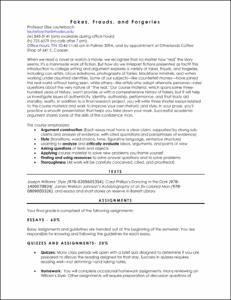Please use this identifier to cite or link to this item:
http://hdl.handle.net/10267/4826Full metadata record
| DC Field | Value | Language |
|---|---|---|
| dc.contributor.author | Lauterbach, Elise | - |
| dc.date.accessioned | 2009-11-23T22:46:59Z | - |
| dc.date.available | 2009-11-23T22:46:59Z | - |
| dc.date.issued | 2009-08-26 | - |
| dc.identifier.uri | http://hdl.handle.net/10267/4826 | - |
| dc.description | This syllabus was submitted to the Office of Academic Affairs by the course instructor. | en_US |
| dc.description.abstract | When we read a novel or watch a movie, we recognize that no matter how "real" the story seems, it's a manmade work of fiction. But how do we interpret fictions presented as fact? This introduction to college writing and argument explores a variety of fakes, frauds, and forgeries, including con artists, circus sideshows, photographs of fairies, blackface minstrels, and writers working under assumed identities. Some of our subjects—like counterfeit money—have joined the real world without being seen, while others—like artists who adopt alternate personas—raise questions about the very nature of “the real." Our course material, which spans some three-hundred years of history, won't provide us with a comprehensive history of fakers, but it will help us investigate issues of authenticity, identity, authorship, performance, and that trusty old standby, reality. In addition to a final research project, you will write three shorter essays related to the course material and work to improve your own rhetoric and style. In your prose, you'll practice a smooth presentation that helps you take down your mark. Successful academic argument shares some of the skills of the confidence man. This course emphasizes: Argument construction (Each essay must have a clear claim, supported by strong sub-claims and analysis of evidence, with cited quotations and paraphrases of evidence) Style (transitions, word choice, tone, figurative language, sentence structure) Learning to analyze and critically evaluate ideas, arguments, and points of view Asking questions of texts and objects Applying course material to solve new problems you frame yourself Finding and using resources to solve answer questions and to solve problems Thoroughness (All work will be carefully conceived, cited, and proofread) | en_US |
| dc.language.iso | en_US | en_US |
| dc.publisher | Memphis, Tenn. : Rhodes College | en_US |
| dc.relation.ispartofseries | Syllabi CRN;10190 | - |
| dc.rights | Rhodes College owns the rights to the digital objects in this collection. Objects are made available for educational use only and may not be used for any non-educational or commercial purpose. Approved educational uses include private research and scholarship, teaching, and student projects. For additional information please contact archives@rhodes.edu. Fees may apply. | - |
| dc.subject | English, Department of | en_US |
| dc.subject | Syllabus | en_US |
| dc.subject | Curriculum | en_US |
| dc.subject | Academic departments | en_US |
| dc.subject | Text | en_US |
| dc.subject | 2009 Fall | en_US |
| dc.title | ENGL 151-08, Fakes, Frauds, and Forgeries, Fall 2009 | en_US |
| dc.type | Syllabus | en_US |
| Appears in Collections: | Course Syllabi | |
Files in This Item:
| File | Description | Size | Format | |
|---|---|---|---|---|
| 2009_FALL_ENGL_151_08_10190.pdf | 179.05 kB | Adobe PDF |  View/Open |
Items in DSpace are protected by copyright, with all rights reserved, unless otherwise indicated.